What Is a Den in a House? (Versus a Family or Living Room)
Author: Rick Worst | Editor: Omar Alonso
Review & Research: Jen Worst & Chris Miller
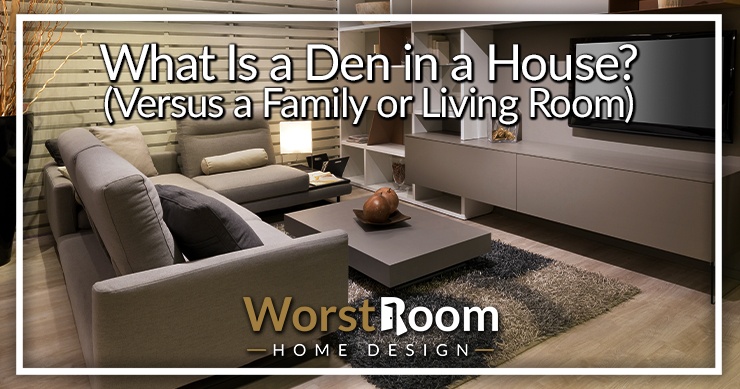
Have you ever wondered about the tucked-away room in your house called a den? You're in luck! In this article, we'll explore the captivating world of dens as we delve into their definition and function in houses. What is a den in a house?
We'll also learn how dens can serve multiple purposes - from a private sanctuary to a casual entertaining hub. So read ahead and discover the immense potential of this often-overlooked room in your home.
What Is a Den in a House?
A den in a house is a versatile and cozy room that provides a secluded space for relaxation and recreation. It’s typically smaller than other rooms in the house, but its compactness adds to its charm.
The den can be customized to suit individual preferences and needs, making it a multipurpose area that caters to various activities.It can be a comfortable home office, providing a secluded and focused environment for work or study. Alternatively, it can transform into an enjoyable game room, with space for gaming consoles, board games, or a pool table.
What sets a den apart from other living spaces in a home is its secluded nature. Often featuring separate entrances, it provides added privacy and serves as an ideal space for homeowners seeking an additional area solely dedicated to their interests while remaining connected to the main living areas of the house.
Differences Between a Den, Family Room, & Living Room
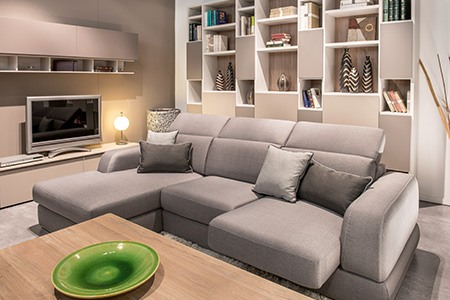
When planning your ideal home interior design, it's important to understand the distinctions between a den, family room, and living room. These three spaces serve different purposes and offer distinct atmospheres.
What is a den room? A den is typically smaller, creating an intimate setting for relaxation, reading, or working. It can be situated on the main floor, near the front door, or in other areas of the house. This quiet and cozy space allows you to escape distractions and enjoy privacy. That's the basic den room meaning.
On the other hand, a family room is designed for communal gatherings and entertainment. It is a place where family members come together to spend quality time, watch movies or engage in other activities as a group. The family room as opposed to a living room is often equipped with comfortable seating and entertainment systems.
Lastly, the living room is a central area for hosting guests and showcasing your taste in decor with more formal furnishings. It’s typically larger than a den or family room. The living room provides a cozy but elegant and sophisticated atmosphere. In the den vs. living room discussion, the den is more casual and laid back.
Types Of Dens
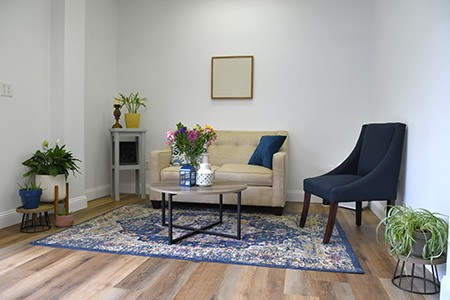
What is a den in a house in terms of their multiple uses? The den meaning in a house can vary. There are several types of dens that can be found in a house, each serving a unique purpose and catering to the interests and needs of the household members:
Home Office: A den designed as a home office provides a dedicated space for individuals to work or study without distractions from other areas of the house.
Serene Sitting Room: Some homeowners prefer a den over tea or coffee for relaxed conversations. These sitting rooms provide a tranquil atmosphere and are ideal for unwinding or engaging in intimate conversations with friends or family.
Library-Style Den: For homes that embrace knowledge and reading culture, a den designed as a library can be a haven for literary enthusiasts. It features bookshelves, cozy seating, and a serene ambiance, creating a welcoming sanctuary for book lovers.
Fitness Den: For fitness enthusiasts, a den can be transformed into a small home gym. It can feature exercise equipment such as a treadmill, weights, yoga mats, and mirrors to create a convenient and private space for workouts.
For additional ideas, you can look at this long list of ways to use an unused den (or flex room as they call it).
Benefits of Having a Den in a House
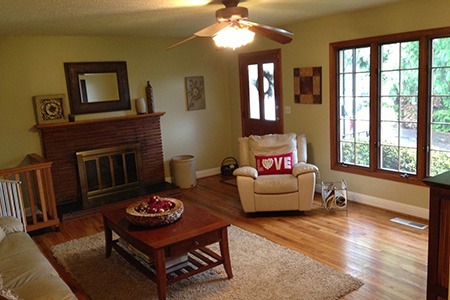
Having a den in your house offers numerous benefits that enhance your living experience and increase the value of your property:
Provides Additional Living Space
A den is a wonderful addition to any home, providing extra living space for various purposes. It offers a cozy and intimate atmosphere, making it an ideal spot for relaxation or gatherings with family and friends.
Compared to the main living room or family room, a den provides a more laid-back setting for spending quality time with loved ones or entertaining guests. Plus, a well-designed den can serve as a media area or game room, allowing you to indulge in your favorite hobbies without the distractions of other activities around you.
Creates a Private Sanctuary
A den in your home can offer a haven where you can retreat and unwind in solitude. It's an exclusive space that can be used for various activities, whether it's meditation, relaxation, or simply escaping the hustle and bustle of the household.
What makes this private sanctuary even better is that you're not restricted to one specific purpose. You can easily transform it from a home office during the day into a home theater in the evening.
Adds Value to Property
Having a den in your house not only expands your family's living space but also enhances your property's value. What is a den in a house? Dens are considered valuable bonus rooms, providing an extra area for entertainment and relaxation, which is highly appealing to potential buyers.
You can significantly increase your home's resale potential by transforming your den into an additional bedroom with furniture. Even if you choose not to convert it into a bedroom, a well-designed and functional den still holds value in the real estate market as it offers extra living space that many families desire.
For instance, with the current rise in remote work due to the Covid-19 pandemic, incorporating an office nook within the den can attract business professionals seeking homes with adaptable spaces for work-from-home setups.
Designing & Styling Your Den
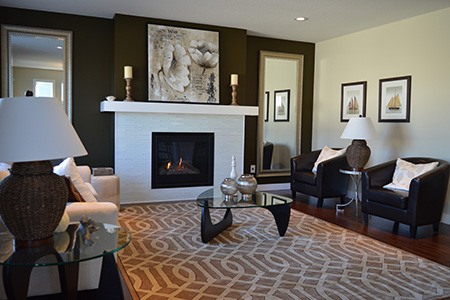
When designing and styling your den, it's important to select a secluded location, away from frequent foot traffic, that offers a sense of privacy. Here are some helpful tips on how you can design your den for your specific needs:
Choosing the Right Location
Selecting the ideal location for your den requires careful consideration. To begin with, think about the primary purpose of the space and how you envision using it.
Additionally, lighting plays a critical role in den design. If you anticipate using your den during the day, choose a location with ample natural light. Conversely, opt for a spot with subdued lighting options if you intend to use it primarily as a cozy evening getaway. The discussion about daylight versus soft white light for your living room will interest you.
Layout & Furniture Arrangement
Your den's layout and furniture arrangement are key components of its design and styling. Since it’s a space meant for relaxation and customization, it's essential to tailor the layout to meet your needs.
To achieve this, consider the room's intended purpose when selecting furniture and determining placement. For instance, a comfortable sectional sofa can be an ideal choice for promoting relaxation in a den. Additionally, to enhance the functionality of the space, consider creating designated areas within the room for hobbies or workspaces, ensuring that each activity has its dedicated space.
Lighting & Functionality
Lighting plays a pivotal role in the design and styling of a den, as it can completely transform the ambiance and create various moods. To ensure both functionality and aesthetic appeal, it's important to incorporate different types of lighting into your den.
By combining ambient, task, and accent lighting, you can elevate the overall appeal of the space. Mood lighting, for example, can create a cozy and inviting atmosphere, while task lighting provides ample illumination for reading or performing tasks.
Accent lighting can showcase decorative elements like artwork or furniture pieces, adding visual interest and depth to the room. But if you prefer a minimalist design scheme, natural lighting can highlight clean lines and neutral colors, emphasizing a sense of simplicity and openness in your den.
Adding Personal Style
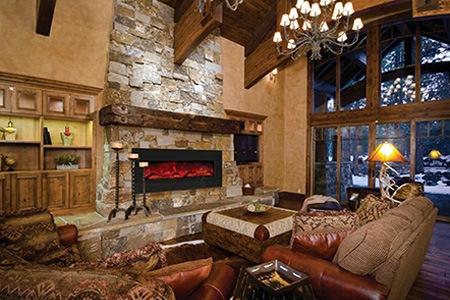
What is a den in a house if not a reflection of your own style? Infusing your personal style into your den's design and styling is crucial to creating a space that truly feels like home. To achieve this, it's important to incorporate furniture pieces and accessories that reflect your unique personality, resulting in a warm and inviting atmosphere.
When personalizing your den, consider selecting artwork, decorative pieces, and textiles that harmonize well in terms of color coordination, proportion, and overall balance within the room. You can create a cohesive and visually pleasing environment by carefully curating these elements.
Incorporating Technology & Amenities
Upgrading your den with modern technology and amenities can significantly improve its functionality and comfort. Adding features like a convenient charging station for your phone, a smart TV, or a top-notch sound system allows you to enjoy both convenience and entertainment in your personal space.
Furthermore, selecting furniture with built-in storage can offer a practical solution to keep your books, games, and other belongings organized and within reach. Plus, when planning the layout of your den, consider the number of power outlets you will need to accommodate all your electronic devices.
So, What is a Den in a House?
When designing and decorating your den, it's essential to consider factors such as the optimal location, efficient layout, appropriate furniture arrangement, and suitable lighting to create an inviting ambiance. You can transform your den into a truly exceptional and personalized retreat by incorporating personal style and desired amenities.
So, what is a den in a house? To sum up, a den is a compact and inviting space within a house that serves multiple functions, such as relaxation, entertainment, or work. It not only offers additional living space but also enhances the overall value of the property.



